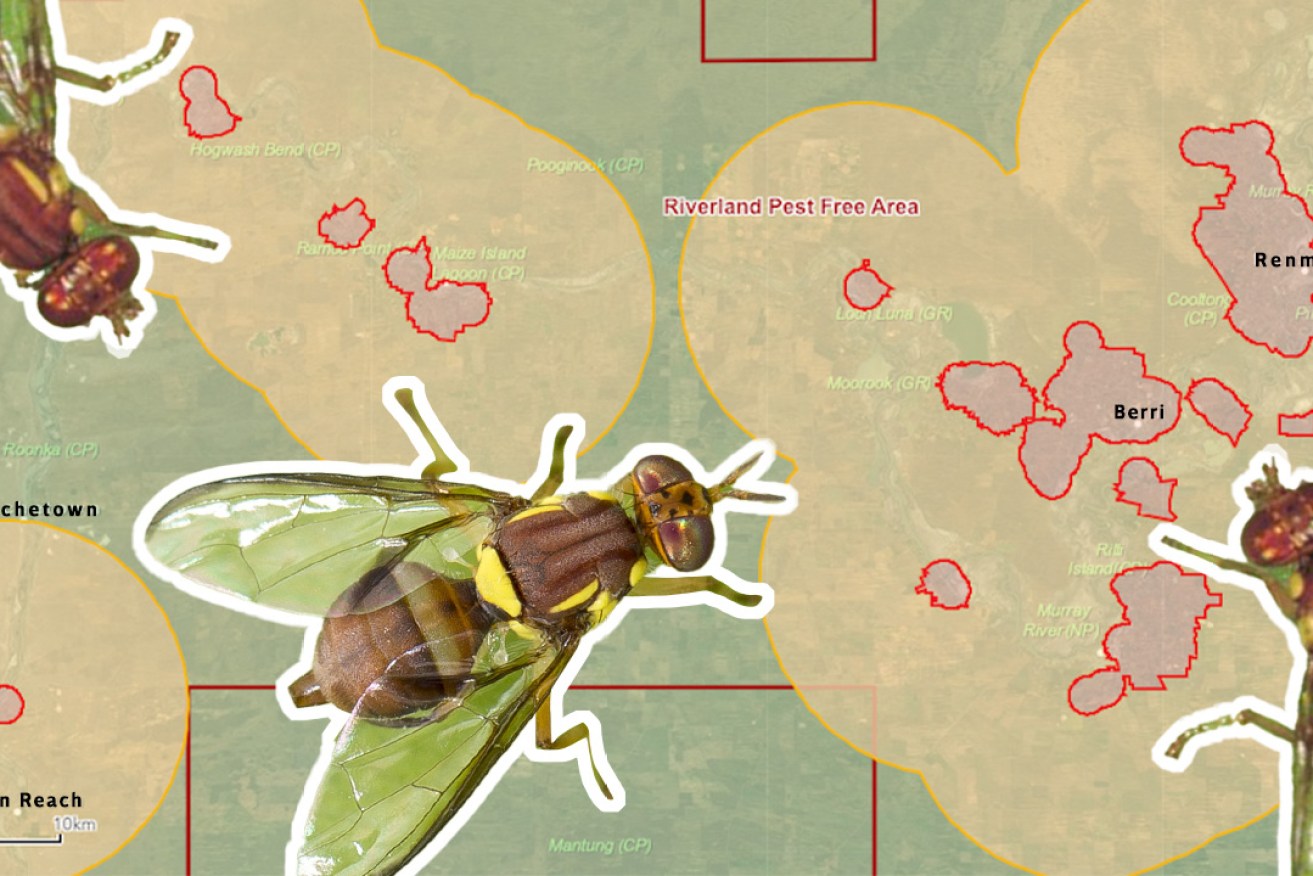Fruit fly ‘red zones’ spiralling in Riverland
When the Riverland launched an all-out battle to eradicate fruit fly one year ago it was facing 14 outbreaks – now the powerhouse driving the $1.4 billion horticulture industry is dealing with 43 red zones.


Riverland fruit fly outbreak, growers are battling 43 outbreak zones.
Embattled Riverland horticulturalists say they are not beaten but are in the midst of their most intensive effort yet, training sniffer dogs to find Queensland fruit fly larvae and preparing to release another 40 million more sterile fruit flies a week over spring.
Citrus growers are currently on the frontline as oranges, mandarins and lemons are harvested, but Riverland Fruit Fly Committee chair Jason Size said avocadoes and backyards locust trees are next to fruit as growers battle to save national and premium overseas markets.
“Then we move into stone fruit season, peaches, nectarines, plums, apricots,” Size said.
Despite the daunting task ahead, Size is still positive the Riverland can beat the pest, attributing the higher numbers of outbreaks recorded on a far more rigorous detection program in what was previously the nation’s only pest-free area.
Two dogs trained in the Riverland town of Loxton; Max, a four-year-old Border Collie cross Koolie, and Rylee, a three-year-old German Shepherd, are being used to sniff out larvae, while rules around infected zones are far stricter.
There are more attract-and-kill traps, more checks and vigilant locals working alongside a State Government funded program that has seen 20 million sterile flies released every week from August last year until mid-April this year.
Release numbers will be doubled this spring as a new sterile fly breeding facility in Port Augusta comes on line in a bid to stop pest flies from reproducing.
Size said rigorous detection of outbreaks gives the region the best chance of beating the problem that has already forced about a dozen growers out of business.
The Riverland fruit fly outbreak is seeing the region losing some key markets and facing expensive new costs cold sterilising or chemically-treating fruit.
Now, the greatest threat is coming from South Australians or other travellers failing to follow the rules and bringing fruit into the zone. This can quickly destroy efforts with Size saying “one apple is one outbreak”.
“The mental stress of having to deal with it, the extra processing that needs to happen, no longer having the ability to share fruit, that social nature of being able to give your neighbour some fruit has gone but when we clean it up, we can go back to it,” he said.
“We think we have a real chance. We’ve found a lot of the outbreaks early, we need time to get on top of this but we need everyone’s help.”
The Riverland, Swan Hill and Goulburn Valley are responsible for more than 50 per cent of the nation’s stone fruit production.
In terms of citrus, there are 5518 hectares of the Riverland planted, making it the third-largest growing region in Australia.
Primary Industries Minister Clare Scriven said the good news was that of the 43 current outbreaks, “16 haven’t had any new detections within the outbreak area for the past 12 weeks”.
“Our operational teams are applying fruit fly bait, deploying thousands of devices to attract and kill the pest and collecting fallen fruit from affected sites as well as releasing millions of SIT (Sterile Insect Technology) flies every week to combat the pest,” Scriven said.
She said the surveillance efforts increased significantly with the expansion of the detection dog program, increased trapping, including trialling the use of deploy attract and kill devices, and greater technical checks throughout the outbreak and suspension areas.
Primary Industries also had partnered with the District Council of Loxton Waikerie for a voluntary fruit tree removal and replacement program in backyards.
“The Port Augusta SIT fly facility is set to be expanded from September this year doubling the amount of SIT fly produced at the site from 20 million to 40 million every week,” she said.
“This will play a key role in eradicating the pest from outbreak sites in the Riverland.”




